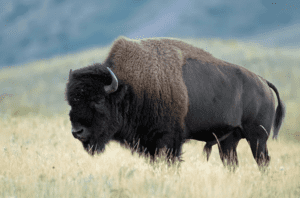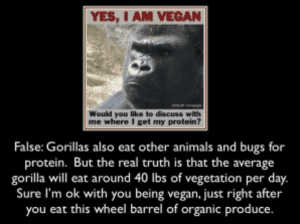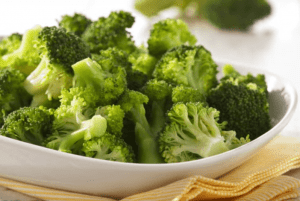Today I am going to take you down the path of why completely vegetarian and vegan diets are not healthy or beneficial for long term fat loss and health.
Everybody pay close attention to this article on vegetarian and vegan diets, because I’m not going to revisit the topic very often.
There are two kinds of people that I do not prefer to take on as clients. Vegetarians/Vegans and Cardio Addicts. The main reason is that they often do not want to make the necessary changes to their lifestyle to get the health benefits or body composition changes they desire. Today I am going to take you down the path of why a person might start eating a completely vegetarian and vegan diet and why it’s not healthy or beneficial for long term fat loss and health. Pay attention for links to studies and supporting articles.
For some it is a choice based on ethics, in the belief that eating animals is cruel. These are the hardest people to work with when it comes to changing their diet. If you follow this logic, I guess being a vegetarian is more of an act of revenge, because plants are carnivores themselves. “Plants don’t eat dirt and poop any more than we do” – Paul Chek. Everywhere in nature, life eats life. It is the circle of life. For those that need a reference to this, I would suggest The Lion King. For those who want more science Paul Chek did an excellent piece with research from the Weston A. Price foundation on vegetarianism and its history. It showed that meat eating tribes always had better health than their neighboring vegetarian tribes. Very few vegetarian tribes actually existed.
Others choose a vegetarian or vegan diet because they believe it will improve their health. This is a half truth. When it comes to meat, or any animal products in general, they are not created equal. Much research has surfaced on the negatives of eating red meat, whether it be related to cancer, inflammation or heart disease. These studies were not all incorrect, but more so misleading.
Let’s use beef as our meat. Commercial beef is grain fed with wheat and corn in large processing plant that raise the animals in high bacterial inhumane conditions. This meat is than processed in a factory impossible to keep sanitary, and is thus treated with chemicals to clean it before being shipped to your store. If you feed animals with grains like wheat and corn you get the same result as you get if you feed people wheat and corn. Fat and sick. I believe over 80% of the antibiotics used in the world are for agricultural uses, just to keep the animal alive in these poor conditions until they can be slaughtered. The resulting meat is not healthy for you, which should be no surprise to anyone.

Conclusion: Is meat bad for you? No, bad quality meat is bad for you. Organic, grass fed, pasture raised meat is very good for you. All the research done on red meat being bad for you is done using commercial grain fed animals.
There are many negatives to removing quality meat from your diet. The average person needs 60g of protein a day just to run their basic functions like energy production, immune function and detoxification.
Not getting enough protein in your diet is very detrimental to your long term health.
Why can’t I just get protein from plant based foods?
Some plant foods do contain protein, but not all proteins are created equal. The benefit of animal proteins is that they tend to be very high in certain amino acids that are essential for health and performance that are lacking in vegetarian and vegan diets. The more physical activity you do each day the more important these amino acids become. Even if you don’t exercise, these proteins help with brain function, detoxification, and immune function as well.
Most research shows vegetarian and vegan diets lead to low levels of B12, Iron, Omega 3’s, zinc and magnesium. These nutrients are vital for many bodily functions. Other studies have found a Vegan diet has a negative effect on bone bone density because of lack of highly bioavailable calcium found in meat. For people with osteopenia or osteoporosis they may find that eating a diet high in protein from pasture raised meats is more effective than supplementing with calcium supplements.
This is a question with multiple reasons. The first and most common answer is that more and more people are losing their digestive health. Low stomach acid production is a vastly growing problem that results in nutritional deficiencies, and digestive disorders. When stomach acid levels are low, protein digestion is poor. This is what leads to the heavy bloating feeling after eating meat and can be stressful and uncomfortable. It also means that you will not be getting the energizing and nutritional benefits from eating meat. The second role of stomach acid is to help stimulate bile production which helps break down food further especially fats. Animal products should contain healthy fats, but when not digested, they also just cause digestive issues. An example of an symptom of low HCl is the dreaded fish oil burp.
The second reason people see results on a vegetarian or vegan diet is reduced inflammation. This can occur because they are now eating more vegetables than before, eating less poor quality meats, or because they have eliminated foods they were intolerant to. Food intolerances occur when your body starts to develop an inflammatory immune response to the proteins in the food you’re eating. It can be any food, and doesn’t always have to be proteins. Many people have intolerances to fructose which is a sugar found in fruits and veggies, but in higher amounts in sugary foods and beverages. Food intolerances usually occur after the digestive system becomes compromised. It has nothing to do with whether or not the food is good or bad for you. If someone has an intolerance to chicken because they have been following a low fat diet too long and switches to a vegan diet with no meat, they will see the benefits of removing the chicken, even though they didn’t need to remove the rest of the meats.
The third reason is the consumption of more cruciferous vegetables and fruits with antioxidants and fiber. Antioxidants and fiber are two of the most important nutrients for vitality and weight loss. Eating more green vegetables and high antioxidant fruits like blueberries is hard to argue with. These same benefits would be seen though even if meat was not removed from the diet. Fiber is critical for digestive health, detoxification, and help control the digestion and absorption of carbohydrates. This is why most research on diabetes finds that that switching to vegetarian and vegan diets provide similar blood markers to a typical diabetes diet over short periods of time.
We you have the compounding reasons above, but the reality is that there are people on the planet that have great genetics. Everyone has met that person that can eat whatever they want and still sport a six pack while eating pizza, soda and beer. Professional athletes are notorious for having horrible diets and still staying extremely lean. These are the exceptions not the rule. If you were to take an average of everyone embarking on a vegan/vegetarian diet, you would find that this is not a common trait. I have seen ripped vegetarians and obese vegetarians and everything in between. Another possibility is that the person simply has not been eating a vegan diet long enough to see any negative effects.


”I have seen hundreds of lab tests of vegans and honestly have only seen one that was normal. And that was a vegetarian body builder who spent much of his day designing his diet to include all types of vegan protein sources. Very hard work.” – Mark Schauss, Lab Interpretations LLC
How do I know if I have low stomach acid or food intolerances? The best way is to contact a Functional Medicine Doctor near you to discuss and HCl test for stomach acid production and an MRT test for food intolerances. You can perform the HCl test easily for yourself at home by purchasing a kit. If you would like to have a food panel test for intolerances, the best one is done through Cyrex Labs.
As a whole diet program, no I don’t think there is much benefit to vegetarian and vegan diets. We are much healthier when consuming quality meats than without them. I do however support going up to 5 days per month eating a vegan style diet for those dealing with inflammation and digestive issues. Proper supplemental and adjustments to your exercise program should be made during this time, but it can provide improved results to do this periodically. I would not exceed 5 days, and this is for a person that is eating adequate amounts of protein the other days of the month.
Alright everybody pay close attention to this article, because I’m not going to revisit the topic very often.
There are two kinds of people that I do not prefer to take on as clients. Vegetarians/Vegans and Cardio Addicts. The main reason is that they often do not want to make the necessary changes to their lifestyle to get the health benefits or body composition changes they desire. Today I am going to take you down the path of why a person might start eating a completely vegan or vegetarian diet and why it’s not healthy or beneficial for long term fat loss and health. Pay attention for links to studies and supporting articles.
For some it is a choice based on ethics, in the belief that eating animals is cruel. These are the hardest people to work with when it comes to changing their diet. If you follow this logic, I guess being a vegetarian is more of an act of revenge, because plants are carnivores themselves. “Plants don’t eat dirt and poop any more than we do” – Paul Chek. Everywhere in nature, life eats life. It is the circle of life. For those that need a reference to this, I would suggest The Lion King. For those who want more science Paul Chek did an excellent piece with research from the Weston A. Price foundation on vegetarianism and its history. It showed that meat eating tribes always had better health than their neighboring vegetarian tribes. Very few vegetarian tribes actually existed.
Others choose a meat-free diet because they believe it will improve their health. This is a half truth. When it comes to meat, or any animal products in general, they are not created equal. Much research has surfaced on the negatives of eating red meat, whether it be related to cancer, inflammation or heart disease.
These studies were not all incorrect, but more so misleading. Let’s use beef as our meat. Commercial beef is grain fed with wheat and corn in large processing plants that raise the animals in high-bacterial inhumane conditions. This meat is then processed in a factory impossible to keep sanitary, and is thus treated with chemicals to clean it before being shipped to your store. If you feed animals with grains like wheat and corn you get the same result as you get if you feed people wheat and corn. Fat and sick. I believe over 80% of the antibiotics used in the world are for agricultural uses, just to keep the animal alive in these poor conditions until they can be slaughtered. The resulting meat is not healthy for you, which should be no surprise to anyone.

There are many negatives to removing quality meat from your diet. The average person needs 60g of protein a day just to run their basic functions like energy production, immune function and detoxification. To clarify, by “average person” we’re talking about a sedentary individual that does not have a higher-than-normal amount of muscle mass, which is likely not most you reading this article.
Not getting enough protein in your diet is very detrimental to your long term health.
Some plant foods do contain protein, but not all proteins are created equal. The benefit of animal proteins is that they tend to be very high in certain amino acids that are essential for health and performance. The more physical activity you do each day the more important these amino acids become. Even if you don’t exercise, these proteins help with brain function, detoxification, and immune function as well.
Most research shows vegetarian diets lead to low levels of B12, iron, omega 3’s, zinc and magnesium. These nutrients are vital for many bodily functions. Other studies have found a vegan diet has a negative effect on bone density because of the lack of highly bioavailable calcium found in meat. For people with osteopenia or osteoporosis they may find that eating a diet high in protein from pasture raised meats is more effective than supplementing with calcium supplements.
This is a question with multiple reasons. The first and most common answer is that more and more people are losing their digestive health. Low stomach acid production is a vastly growing problem that results in nutritional deficiencies, and digestive disorders. When stomach acid levels are low, protein digestion is poor. This is what leads to the heavy bloating feeling after eating meat and can be stressful and uncomfortable. It also means that you will not be getting the energizing and nutritional benefits from eating meat.
The second role of stomach acid is to help stimulate bile production which helps break down food further especially fats. Animal products should contain healthy fats, but when not digested, they also just cause digestive issues. An example of an symptom of low HCl is the dreaded fish oil burp.

The third reason is the consumption of more cruciferous vegetables and fruits with antioxidants and fiber. Antioxidants and fiber are two of the most important nutrients for vitality and weight loss. Eating more green vegetables and high antioxidant fruits like blueberries is hard to argue with. These same benefits would be seen though even if meat was not removed from the diet. Fiber is critical for digestive health, detoxification, and help control the digestion and absorption of carbohydrates. This is why most research on diabetes finds that that switching to a vegan diet provides similar blood markers to a typical diabetes diet over short periods of time.
We you have the compounding reasons above, but the reality is that there are people on the planet that have great genetics. Everyone has met that person that can eat whatever they want and still sport a six pack while consuming pizza, soda and beer. Professional athletes are notorious for having horrible diets and still staying extremely lean. These are the exceptions, not the rule.
If you were to take an average of everyone embarking on a vegan/vegetarian diet, you would find that this is not a common trait. I have seen ripped vegetarians and obese vegetarians and everything in between. Another possibility is that the person simply has not been eating a vegan diet long enough to see any negative effects.
Animals have different digestive systems than we do. A cow is a vegetarian, but it also has 2 stomachs and can digest parts of plants that we can not.
Humans cannot digest grass, it will make us sick. Cows can build massive 2,000 lb bodies from it.
A gorilla for instance is not a complete vegetarian, but it eats about 40 pounds worth of plant life per day. It can digest the main sugar source in plants (cellulose). This is how they can be so large and powerful while not consuming much meat. Humans cannot digest cellulose, otherwise vegetables would be like stacks of sugar for us.

These factors all increase fat storage and muscle loss. The reason most of this is overlooked is that these are not short term symptoms, but conditions that accumulate over time. I have also included to two main health issues which put people onto the path of a vegetarian diet. Consequently people on the SAD (standard american diet) of high sugar, gluten, and grain fed meats also suffer from these same conditions through some of the same and alternate pathways.
”I have seen hundreds of lab tests of vegans and honestly have only seen one that was normal. And that was a vegetarian body builder who spent much of his day designing his diet to include all types of vegan protein sources. Very hard work.” – Mark Schauss, Lab Interpretations LLC
How do I know if I have low stomach acid or food intolerances? The best way is to contact a Functional Medicine Doctor near you to discuss and HCl test for stomach acid production and an MRT test for food intolerances. You can perform the HCl test easily for yourself at home by purchasing a kit. If you would like to have a food panel test for intolerances, the best one is done through Cyrex Labs.
As a whole diet program, no. We are much healthier when consuming quality meats than without them. I do however support going up to 5 days per month eating a vegan style diet for those dealing with inflammation and digestive issues. Proper supplemental and adjustments to your exercise program should be made during this time, but it can provide improved results to do this periodically. I would not exceed 5 days, and this is for a person that is eating adequate amounts of protein the other days of the month.
Please Log In to Submit Your Question

Please log in to access the menu.